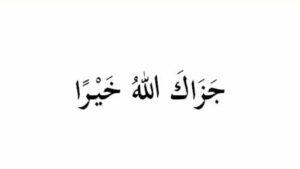
In the vast and diverse world of Islamic phrases, Jawaban Jazakallah Khairan Untuk Wanita- holds a special place. It’s a heartfelt expression of gratitude, often exchanged between Muslims. But what’s the appropriate response for women when they hear Jawaban Jazakallah Khairan Untuk Wanita-? That’s what I’ll be diving into in this article.
Understanding the nuances of Islamic phrases can be a bit tricky, especially for those new to the culture or language. However, it’s crucial to get it right. So, whether you’re a Muslim woman seeking to respond appropriately, or just someone interested in Islamic culture, you’re in the right place. Let’s unravel the mystery together.
Jawaban Jazakallah Khairan Untuk Wanita-
In the world of Islamic phrases, Jawaban Jazakallah Khairan Untuk Wanita- holds a special place, demonstrating the culture’s deep regard for gratitude and well-wishing. It’s a phrase rolled off the tongues of Muslims after receiving kindness or help from others. Simply put, Jawaban Jazakallah Khairan Untuk Wanita- is a way to say, “may Allah reward you with goodness”. It’s much more than a proverbial tip of the hat or passing thanks: it’s a weighty acknowledgment of gratitude, invoking divine reward for good deeds.
The phrase is made up of three main parts. ‘Jazak’, an Arabic term, primarily means ‘may He give’ or ‘may He provide.’ When we add ‘Allah’ – the Arabic word for God – to it, they collectively mean ‘May Allah give’. Lastly, the term ‘Khairan’ translates to ‘goodness’ or ‘blessings’, implying a sense of gratitude embedded deep within the phrase.
This phrase is not just used as a verbal token of appreciation, but it’s a spiritual gesture, showing devout Muslims’ belief in divine blessings and rewards. The phrase encourages a positive cycle of kindness and good deeds, as each ‘Jazakallah Khairan’ returns the favor to the doer, invoking blessings from Allah.
Proper Response for Women
When it comes to responding to “Jazakallah Khairan,” it’s crucial to grasp that Islamic etiquettes encourage politeness, respect, and mutual appreciation. There isn’t a gender-specific way to respond. Men and women alike are encouraged to reciprocate the sentiment. In essence, the underlying principle is mutual gratitude and respect, transcending gender boundaries.
Alternatively, ‘Barakallah Fiik’ equates to ‘May Allah bless you.’ Responding with this phrase signifies a deep desire for the divine to shower blessings and well-being on the original speaker. It’s a manifestation of the Islamic principle of wishing well for all, irrespective of gender.
In practice, women responding to Jawaban Jazakallah Khairan Untuk Wanita- are not just reciprocating a verbal sentiment. They’re reinforcing a beautiful social cycle based on the Islamic worldview that encourages mutual appreciation, respect, and kindness. The phrase is ultimately a vehicle for these values, fostering positivity and strengthening bonds within the community.
Cultural Importance
From the cultural perspective, such exchanges contribute to the cycle of thankfulness, strengthened by faith and solidarity. It’s particularly important for women in Islamic societies, where the emphasis is on equality, reverence, and compassion in relationships.
The act of using these responses isn’t just significant within an Islamic context. It also contributes to enhancing a better understanding of the culture, fostering building bridges across varying backgrounds and nationalities. Cultural exchanges, in all their forms, play an instrumental role in promoting unity, fostering peace, and enhancing mutual respect among diverse populations.
In essence, the way one responds to Jawaban Jazakallah Khairan Untuk Wanita- carries a weight of significance that extends beyond just a polite answer—it’s part of the broader cultural narrative that the Islamic community shares with the world. Engaging in dialogue and practicing these responses allows everyone, including women, to partake in the tapestry of tradition that brings people together and underscores the power of connection. Understanding these processes is crucial to broadening perspectives on global human interaction in a growingly cosmopolitan world.
Misconceptions to Avoid
As we continue our exploration of Islamic customs, it’s crucial to address any misconceptions that are often associated with the cultural response phenomena. Some view the exchange of phrases like Jawaban Jazakallah Khairan Untuk Wanita- and “Wa iyyakum” as mere formalities, with no real significance beyond politeness. That’s far from the truth. These verbal exchanges have deeply embedded meanings, representing the intricate fabric of Islamic culture where a simple “thank you” and the responding “you’re welcome” is an act of faith, humility, and respect.
The phrase Jawaban Jazakallah Khairan Untuk Wanita- isn’t restricted to any demographic within the Islamic community either. Although it’s a common misapprehension that this response is specifically for women, the reality is the phrase knows no gender. It’s directed towards any person expressing gratitude, male or female.
Unfamiliarity with Islamic customs may lead many to misconstrue these interactions as ritualistic or unvaryingly traditional. While customs and tradition are at the heart of it, interactions carry a distinct flexibility, capable of adapting to modern settings and evolving over time. It’s crucial for readers to appreciate this dynamic facet of Islamic culture, where cultural retention meets continued adaptation.
Embracing Islamic Expressions
Engaging in Islamic expressions like Jawaban Jazakallah Khairan Untuk Wanita- and the corresponding responses elicit numerous benefits. These aren’t just for individuals but also for wider societal cohesion. A simple utterance signifies respect and gratitude in a way that resonates across cultural borders. Breaking it down, you’ll understand how each expression enables me to show appreciation while also fostering unity.
When I respond to Jawaban Jazakallah Khairan Untuk Wanita- with “Wa iyyakum” or “Barakallah Fiik,” I’m not just living up to a tradition. Instead, I’m actively participating in a broader discourse of shared humility and faith. In doing so, I am promoting inclusivity by blurring cultural lines and religion-based differences.
Contemplate the notion that these expressions are gender-neutral. In a time when equality and diversity are celebrated, these phrases serve as a testament to the Islamic tradition’s adaptability. I love how they detach from gender-specific norms, and therefore permit people of all backgrounds to partake freely.











